Sacred Chickens
Menu
SACRED CHICKENS
|
Oedipus the Delicatessen The mood was festive inside the heaving mud womb people played instruments they could not play so baritone dog packs could belt out forgotten Puccini operas for the not-so-discerning ear, children jumped out of their prams on full basketball scholarships the keys left in the door to repudiate Freud and make felony burglary that much easier, and when I returned from the kitchen I walked into a whole new room entirely and the lamps had goosebumps Act Two, Scene Three: Oedipus the Delicatessen has just done away with his father and opened for business. Vision Quest It wasn’t quite a vision quest so much as an ultimatum, but my father said I had to get out, he seemed to be familiarized with the animal kingdom knowing any challenge to his aging authority would come from within, and the transition was far from easy, when I slept outside the stars were my friends at other times there were couches and a sickly dog to lick the balls of your feet awake each morning with a diseased plastic cone still wrapped around its dying head, and first your own place, then a woman or two before the one that stays, repainting the walls to bring some colour into your life, fresh socks as though the human foot deserves better, and when you sit over tea you blow it back from boil; share the stories that make us human and vulnerable. Tools of the Tirade Here and there those are the two destinations you choose the one you want and I will settle for the other my tools of the tirade anonymous insect admirations glances in directionless directions to upset this newest order a cursed fellowship so grave in its company that seat warmers find themselves alone, weeping to a music that was prepared in jest, by falsified cowboys and their entreatied Indian lovers the momentum of thrusting crotches set in opposition murals over commissioned walls that would rather be naked. The Johnny Cash of Japan It seems I am literate, the billboards are no longer a mystery to me: there are words and I decipher them images fed through the Bletchley of my brain and understood firing squad synapses making Dostoevsky believe he was going to die – a cruel trick by the Czar to be sure but it didn’t end so well for him either – that is the problem with joke shop itch powder, it works on the assumption that the victim of the ruse will laugh, and standing in line at the bank today I realized that if I robbed the place I wouldn’t have to stand in line any longer, I also realized that I did not have an account there and little monies to place in said account even if I did. Basho liked the road. He was the Johnny Cash of Japan. I am a homebody. If I were a Black-capped Chickadee I would build a nest of animal fur and regurgitate into the mouths of my many small children. You Could Make Room for Room, but How Would You Know? Overpopulated like 7000 men standing over a single porcelain urinal taking aim at the current system of governance or anything else which may strike their fancy that is how the pundits describe everything going on television like others once went to space, the only valleys that remain are made of silicon and retire at 25, a butter blonde hanging off each arm like the sleeves of a tired shirt.  Ryan Quinn Flanagan is a Canadian-born author residing in Elliot Lake, Ontario, Canada with his wife and many bears that rifle through his garbage. His work can be found both in print and online in such places as: Evergreen Review, The New York Quarterly, Spillwords, In Between Hangovers, Red Fez, and The Oklahoma Review.
1 Comment
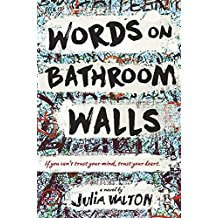 For the past ten years or so, there has been a desire among most Americans to lead a healthier lifestyle. Eating well and exercising regularly are now seen as essentials, and Vegan and Vegetarian diets have become mainstream and fashionable. But most of the modern world still struggles with taking care of their mental health, which has just as much of an effect on a person’s well-being. Even though mental illness has been here since the beginning of humanity, there is still a strong fear and stigma associated with it. In ancient times, people were believed to be possessed by evil spirits, and even as recently as two hundred years ago, mental illness was not met with the same sympathy as it is today. Treatment and initiatives in support of the mental health are often rooted in compassion. Yet many people still are afraid to go to therapy or to take a mental health day from their jobs. Stigmas like these embrace both prejudicial attitudes and discriminating behavior towards those affected, and the social effects of these are far reaching. This definitely shows that the stigma around mental illness is held by a broad spectrum of society and obviously still exists affects people’s lives today. In the spirit of erasing stigma and educating people about that topic, I recently picked up the book Words on Bathroom Walls, by debut author Julia Watson, about a teenager named Adam struggling with Schizophrenia in a Catholic High School where no one knows about his condition. In the midst of trying to cope with everyday teenage issues, he’s also trying not to see the mobsters firing guns in the cafeteria or the elderly woman doing cartwheels down the sidewalk. And how do you tell what’s real and what isn’t? I don’t often find myself really liking a main character as much as I did Adam. There is something so endearing about his portrayal; he’s not some sort of classic cookie cutter character that many YA novels have. He seems like a real person. For instance we learn that he loves to cook, in short, the author let us see the niceties and quirks that make up a real human.. There are times when a book is amazing because it offers an escape from reality, but I find that this particular novel was great because it offered an insight into reality, specifically Adam’s reality. One of my favorite television series was called Perception, and it told the story of Dr. Peirce, a brilliant neuroscientist who struggled with Schizophrenia. Sadly, the show only aired for three seasons, even though it was brilliantly done, in my opinion. Since the show ended, I have seen nothing that so accurately portrays what it is like to have this condition. I found no stigma nor stereotype throughout the book, and I think the author did an excellent job of telling this story without de-humanizing Adam. Oftentimes, I find that anyone with a mental diagnosis like schizophrenia is either feared or shunned. There is even a point in the book where Adam remarks that he would have rather had cancer, because cancer patients got more sympathy and compassion. The entire narrative is told from the letters that Adam writes to his therapist, because he doesn’t want to talk to him during his sessions. From the beginning, we learn that Adam is on a new trial drug to treat his condition. Gradually, he starts to develop an immunity to the drug, ad through his entries, you really get to witness his gradual mental decline. It is sometimes difficult to read, but very important to the story as a whole. Overall, I really did love this book. I think it opens up an important conversation that we all need to have about mental illness, to erase the stigma and the shame associated with it. I also greatly enjoyed the plot. Adam was such a likeable character, and even though his condition is heartbreaking, at the end of the book he still had hope that he would find the right drugs to alleviate his condition, and with the current advancements in the medical field, I feel like he has reason to. 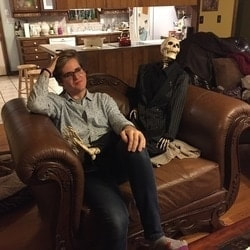 Jarad attends Middle Tennessee State University, loves tea, and tries to spend every spare second reading. Jarad is majoring in English. Bless his heart! Let's all light a candle for him and send him happy thoughts!  A World Where By Paul Brookes Review by Julie Carpenter Here at Sacred Chickens, Paul Brookes is one of our favorite poets. We’ve published a good number of his powerful narrative poems. The poetry speaks for itself. Here are some examples if you've never been introduced: Poverty His Fridge Door Their Mausoleum It is with pride and pleasure that we recommend his book A World Where, physically a small book, but containing, as suggested by the title, a world. Inside find a world where juxtaposition is pointed truth, a world where being alive is a busy sort of death and where aging towards perfect health is a curse and not a blessing. The imagined dystopia cuts close to reality, drawing blood. Narrative poets often lose the poetry, the immediacy of words, in the story – drawing out time and pulling it thin, instead of distilling moments. But Brookes has the rare ability to revel in the moment with a rhythmic thread of words, to suggest the urgent now, while still suggesting the flow of time. Brookes poetry is true and unsettling, hands on the human heart, feeling the beat without flinching. Every poem is a narrative that distills the moment while effortlessly recalling for the reader the necessary context of past and future, one instant in a visible stream of time. He is skilled at twisting the expected into the uncomfortable and allowing the reader to see that this spin was always the truth. A masterful short book of poems that creates an entire world of voices.  Paul Brookes was shop assistant, security guard, postman, admin. assistant, lecturer, poetry performer, with "Rats for Love" and his work included in "Rats for Love: The Book", Bristol Broadsides, 1990. His first chapbook was "The Fabulous Invention Of Barnsley", Dearne Community Arts, 1993. He has read his work on BBC Radio Bristol and had a creative writing workshop for sixth formers broadcast on BBC Radio Five Live. Recently published in Clear Poetry, The Bees Are Dead, Live Nude Poems and others. 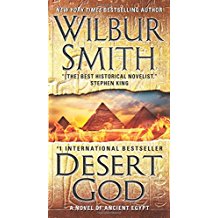 In this compelling novel by Wilbur Smith, the story of Taita, a former slave who has risen to the status of a close advisor to the Pharaoh, continues to unfold. In this installment, Taita finds himself embroiled in a swirling storm of intrigue and danger. He hopes to successfully defeat the Hyksos, whose army have invaded the southern part of Egypt for the last one hundred years. For his plan to work and to reclaim his country, Taita must form an alliance with the powerful nation of Crete; however, he must convince the Supreme Ruler of that country that the Hyksos are not only a threat to his very Egypt, but to Crete as well. As the chaos ensues, the Pharaoh has also tasked him with travelling with the two royal Princesses, Tehuti and Bekatha, across the Arabian Desert and through Babylon to marry them off to the Supreme Minos of Crete, securing the alliance between the two nations against the Hyksos. Though he loves the Princesses dearly and it pains him to see them leave his beloved Egypt, he knows that if he does not do this then Egypt very well may not survive. It was not until after I read this book that I found out that it was the fifth book in a series. I have not read any of the others yet, but I do like the fact that it works well enough as a stand-alone novel that starting at the very beginning is not necessarily required. I found no gaps in the book that I did not understand, and the story flowed nicely without relying on previous plot points from other novels. As for the narrative, it is a fascinating mix of Egyptian mythology and historical fiction. The author transports the reader back to that point in history with vivid clarity. You can see the temples, the palaces, the people and the battles very clearly. The writing, while very mature, neither hinders nor takes you out of the story. Rather, it paints a very clear picture. In short, it’s very well done and I enjoyed it a great deal. While the author describes the culture of Egypt most often and in the most detail, he skims more lightly over the other countries Taita visits. Sometimes, in books like these, I find that the author neglects describing cultures other than the one that the story revolves around, because historical fiction does not often cover multiple cultures at once. However, the vivid imagery of Egypt is present throughout the novel. While it may seem trivial, in this particular novel it played a vital role. For example, when describing the land of Crete. It was vital to see the difference in culture that the Princesses would be marrying into. While obvious, it is something that I find is often overlooked. I absolutely love mythology, and I love learning about it, but I especially love it when mythology is woven throughout a series or novel. This is why I loved the Secrets of the Immortal Nicholas Flamel so much; not only did it have an excellent plot, it was somewhat educational in terms of the mythology, which was an integral part of that story. It seems to be the same with this book. The mythos saturates the story, which is appropriate because it was also a part of everyday life in Egypt. Their religion took a more hands on role than those that we know today. I really enjoyed the scheming and planning that Taita exhibited. There are moments when he and his friend and ally Aton play the ancient game of Bao, sort of like our modern chess. During these moments, I think we get a small glimpse into the way Taita’s mind works, in the ways he distracts Aton and leads him to believe that he is winning, and then makes his winning move. Taita is a master strategist, and I love to see the inner workings of his mind. I like seeing the logic behind the chess moves, so to speak. In summary, I really loved this book, and I definitely plan to continue reading the series, not only because I love Egypt and mythology, but also because the writing is almost addictive, in a way. The vivid imagery the author employs serves to enhance an already fantastic plot. With complex characters, political intrigue, and epic battles, I think it would be hard for anybody to find something that didn’t appeal to them. 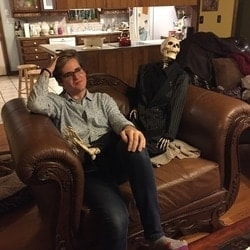 Jarad attends Middle Tennessee State University, loves tea, and tries to spend every spare second reading. Jarad is majoring in English. Bless his heart! Let's all light a candle for him and send him happy thoughts! 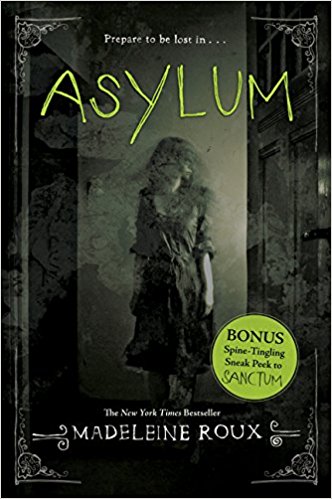 Asylum By Madeleine Roux Review By Jarad Johnson Asylum was characterized as a gripping horror novel about teenager Daniel Crawford who attends a pre-college program at an asylum-turned-dormitory where students can take classes that prepare them for the major they plan to pursue. In the midst of this, he has vivid recurring nightmares and is retrieving strange, poetic messages as the weeks go by. As Daniel and two of his friends begin to uncover more about the Asylum’s grisly past, students at the dorms are being murdered, Daniel begins to wonder just who this killer is. In my experience with writing, I find that sometimes I am so struck by an idea and am in such a rush to get it written down that I find myself not paying attention to the details of the text, but rather the whole picture. This is what I feel that the Author of Asylum did. She so clearly had a great, spooky idea for a story, but I think that the book was lacking in several areas that were possibly overlooked. Firstly, the main characters themselves. The friendship between all of three felt very forced. The scenario the author presented was a two-month pre-college program that would prepare students for actual college. Daniel Crawford, from whose point of view the story is told, is a very awkward person with a history of mental illness, yet he instantly makes friends with two people the day after he arrives. I realize that they had to become friends, but this was just very unbelievable. Also, a predictable and unnecessary romance develops between Dan and Abby that I found superfluous. It didn’t really fit with the story in my mind. The writing itself in this novel is something that I found to be a little problematic. I know that this book falls under that category of, “Young Adult,” fiction (or YA), but the simplistic style of writing speaks more of middle-grade than young adult. It made for a very fast read, but I would have liked to have seen just a little more complexity in this prose. This definitely shows that the novel is meant for a younger audience, but with most YA novels, there is something in them that can appeal to everyone. Unfortunately, while it is true that anyone can enjoy this novel, I don’t think this level of writing will keep the attention of more experienced readers. There are some things that I do like about this book. One of the biggest problems in YA, and in fiction generally, is the lack of diversity and representation. I have to applaud Roux for doing the opposite of that. There were a diverse range of characters here; that is not to say, of course, that the author only included the characters to meet some sort of diversity quota, but by writing a cast of characters who are not all-white, it shows a broader world-view and more accurately represents real life. Also, keeping in mind that the book is aimed at a younger audience, I really like the inclusion of Jordan, a gay character. It is important for children to be able to see themselves, whether it be on tv or in a book. Jordan was an interesting character, full of his own flaws and demons, and the author never made his sexuality the only identifying trait about him, which is so vital when combating stereotypes. Throughout the book, the author chose to insert vintage pictures from old asylums, adding to the creepy factor of the story. The pictures were not always directly related to the scene, but they did give a visual to what was going on. The pictures also showcase a grim reality; that some of our so called medical procedures were not only cruel, but barbaric, especially where asylums were concerned. Even one of the most controversial, “treatments,” that was heavily used during the 40’s and 50’s, electroshock therapy, is still administered to nearly one hundred thousand patients per year. Roux also featured a quote by one of my favorite authors, Ray Bradbury, during the book that really stuck out at me. “Insanity is relative. It depends on who has who locked in what cage.” Overall, I think that the book was very much middle of the road for me. There were some aspects that I liked, but I do think that there are some elements that could use some work- the writing and the forced relationship between the main characters mostly. However, I think that a younger audience could potentially like it better. There is also supposed to be as sequel to Asylum, which surprised me. I do hope that the author improves with the next installment, because this had great potential. 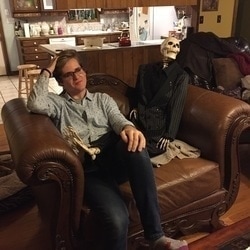 Jarad attends Middle Tennessee State University, loves tea, and tries to spend every spare second reading. Jarad is majoring in English. Bless his heart! Let's all light a candle for him and send him happy thoughts! |

Click Photo above to buy ebook or paperback from Amazon.
Here's the link to Barnes and Noble Or order through your favorite independent bookstore! Categories
All
|
 RSS Feed
RSS Feed